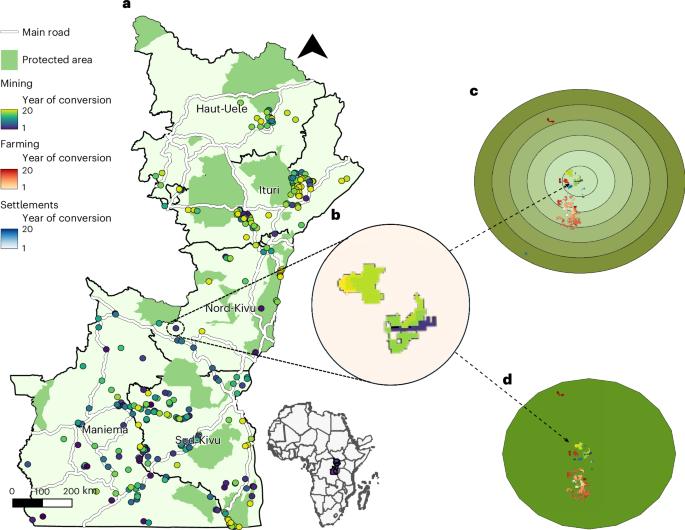Deforestation triggered by artisanal mining in eastern Democratic Republic of the Congo
IF 27.1
1区 环境科学与生态学
Q1 ENVIRONMENTAL SCIENCES
引用次数: 0
Abstract
The discovery of valuable minerals in the mineral-abundant eastern Democratic Republic of the Congo can stimulate extensive migration into remote areas of the Congo Basin rainforest. Despite the widespread practice of artisanal mining, its role in the ongoing deforestation has not received adequate attention. Using difference-in-differences estimation, we show that artisanal mining triggers deforestation at least 5 km from mining sites. Within this distance, the onset of mining causes an additional 4 percentage points of forest loss after 10 years. In total, the indirect deforestation caused by mining through the expansion of other land uses is 28 times larger than the forest area directly cleared for mining. Most of this loss is caused by increased farming around mines, followed by forest cleared for settlements. These indirect effects reveal a much larger role played by artisanal mining in deforestation dynamics than previously assumed and explain at least 6.6% of the total deforestation in the eastern Democratic Republic of the Congo. A wealth of critical minerals has driven widespread artisanal mining in the Congo Basin, bringing with it the risk of deforestation. Statistical analysis of remote-sensing data reveals that mining-associated deforestation is dominated by indirect factors, land-use change to support mining communities, rather than the direct impacts of the onset of mining.

刚果民主共和国东部手工采矿引发的毁林问题
在矿产资源丰富的刚果民主共和国东部地区发现有价值的矿产,会刺激大量人口迁徙到刚果盆地雨林的偏远地区。尽管手工采矿十分普遍,但它在持续的森林砍伐中的作用却没有得到足够的重视。通过差分估算,我们发现手工采矿会在距离采矿点至少 5 公里的地方引发森林砍伐。在这一距离内,采矿开始 10 年后将导致森林损失增加 4 个百分点。总之,采矿业通过扩大其他土地用途而间接造成的森林砍伐是采矿业直接开垦的森林面积的 28 倍。大部分损失是由于矿山周围的耕作面积增加造成的,其次是为定居点开垦的森林。这些间接影响表明,手工采矿在森林砍伐动态中所起的作用要比以前假设的大得多,至少占刚果民主共和国东部森林砍伐总量的 6.6%。丰富的重要矿产推动了刚果盆地手工采矿的广泛开展,同时也带来了森林砍伐的风险。对遥感数据的统计分析显示,与采矿有关的毁林主要是间接因素,即为支持采矿社区而改变土地用途,而不是采矿开始后的直接影响。
本文章由计算机程序翻译,如有差异,请以英文原文为准。
求助全文
约1分钟内获得全文
求助全文
来源期刊

Nature Sustainability
Energy-Renewable Energy, Sustainability and the Environment
CiteScore
41.90
自引率
1.10%
发文量
159
期刊介绍:
Nature Sustainability aims to facilitate cross-disciplinary dialogues and bring together research fields that contribute to understanding how we organize our lives in a finite world and the impacts of our actions.
Nature Sustainability will not only publish fundamental research but also significant investigations into policies and solutions for ensuring human well-being now and in the future.Its ultimate goal is to address the greatest challenges of our time.
 求助内容:
求助内容: 应助结果提醒方式:
应助结果提醒方式:


